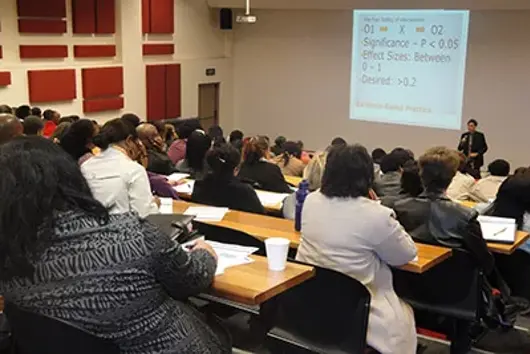The prevalence of drugs in South African communities is a great cause for concern as estimates by the Medical Research Council indicate that about 11% of South Africans are likely to encounter severe alcohol or drug problems during their lifetime. It follows that professionals such as social workers, psychologists and psychiatrists should be equipped to effectively deal with these instances of acute dependency.
On the 24th of July, Monash South Africa played host to 200 social workers who attended a full-day workshop on Advances in Treatments on Substance Dependency. The aim of the workshop was to support and empower social workers in their services to people who use or abuse dependence-producing substances like alcohol and drugs. One of the key discussions at the event was around the international social work treatment modalities.
The workshop was supported by the Monash South Africa Child and Youth Development Studies section and its students, and was opened by the head of Social Sciences, Professor Anna-Mart van Wyk. The event was organised and presented by Dr Wim Roestenburg and Varoshini Nadesan, a Child and Youth Development lecturer. Both volunteer as non-alcoholic trustees for Alcoholics Anonymous South Africa (AA).
“As an institution of higher learning, Monash South Africa is committed to contributing to the consolidation of democracy, social justice, growth and development of South Africa and Africa as a whole. This is why it is important for us to partner with various institutions and members of our communities to actively engage in the combating of substance abuse,” said head of Social Science, Professor Anna-Mart van Wyk.
The workshops are accredited by the SACSSP and are being rolled out countrywide as part of continuous professional development for social workers. In attendance were representatives from the City of Johannesburg, the national departments of Correctional Services, Health, Justice and Constitutional Development, and delegates from various NGOs. Members from Alcoholics Anonymous and Al- Anon were invited to share the AA programme as well.
“We have received a great response in terms of the interest in this programme, which indicates the impact that the workshop has had on those who attended it. This also tells us that there is a definite need for professionals in this field to have the kind of knowledge presented at this workshop,” said Nadesan.
This one-day workshop is presented as a service to the community. More workshops have been scheduled over the next 12 months to be held countrywide, where a need exists to enhance the skills of social service professionals in working with chemical dependants.


